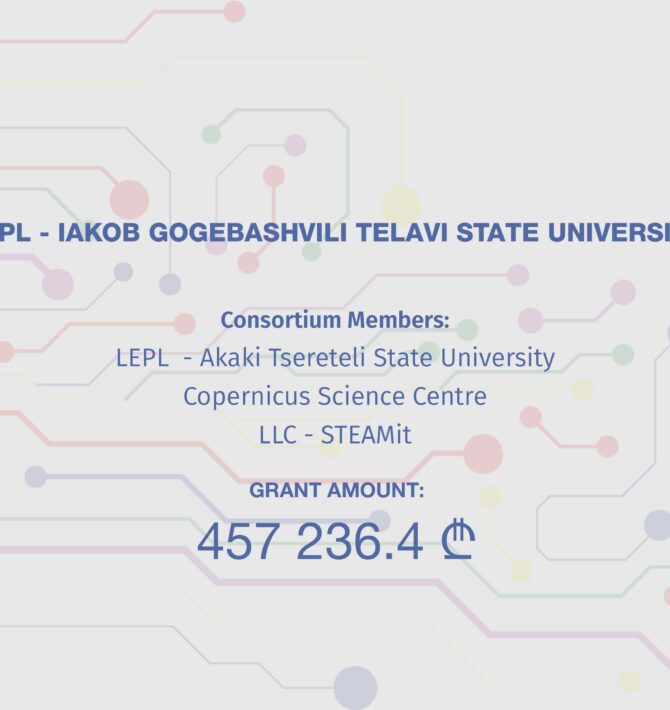STEM concept for University Educational Programs Development (STEM-UPD)
Beneficiaries: Consortium consisting of LEPL Iakob Gogebashvili Telavi State University, Akaki Tsereteli State University, Copernicus Science Centre, “STEAMit”.
Project Name: STEM concept for University Educational Programs Development (STEM-UPD)
Implementation Dates: 06/2024-09/2025
Total Project Cost: 475 679.4 GEL
Grant Amount: 457 236.4 GEL
Description
The goal of the project is to strengthen the STEM direction and develop innovative approaches in the curriculum for current and future teachers at the Faculty of Education Sciences (TESAU) and the Faculty of Pedagogy (ATSU). The project is groundbreaking and distinctive, filling a gap in Georgia’s higher education institutions by introducing a program that raises STEM awareness among current and future teachers. The establishment of STEM teaching in the Kakheti and Imereti regions, adds a novel dimension to the project where pre-service teachers will have practices in pilot schools. The network of STEM clubs will be coordinated by laboratories established on the basis of universities. “STEAMit” will provide support in the preparation and implementation methodology of STEM resources and learning scenarios, and the Copernicus Science Center (Warsaw, Poland) will be a consultant in academic training and the establishment of a network of STEM clubs.
Activities
Important stages of the project implementation are related to the preparation of materials and training of personnel related to STEM methodology. For this purpose, the first visit to the Copernicus Science Center has already taken place, where the team got acquainted with Poland’s experience in the field of STEM: laboratory equipment and the methodology of creating interactive resources, methodological approaches to the introduction of STEM projects in formal education, the principles of functioning of STEM clubs. Other important activities of the project are related to equipping TESAU and ATSU laboratories with basic resources of chemistry, physics, biology, geography, mathematics and engineering-robotics, which will also be used in the teaching of natural sciences and will help in the training process of current and future teachers. Also, STEM laboratories will be equipped with appropriate resources in pilot schools. At the same time, in order to manage the laboratories, trainers of universities and teachers of selected schools will be trained. Preparation of STEM university courses and implementation of the STEM approach in the syllabi of teaching methods of mathematics and natural science is also considered. Additionally, a STEM methodological guide and training modules will be developed. Publishing articles in the high-ranked scientific journal and holding a conference is also planned during the project. Additionally, a website of the project will be created, where all information will be posted.
Sustainability
The prepared courses will become part of the program after the re-accreditation of the curriculum. Also, after the project completion, the created network of STEM laboratories continues to work continuously.







